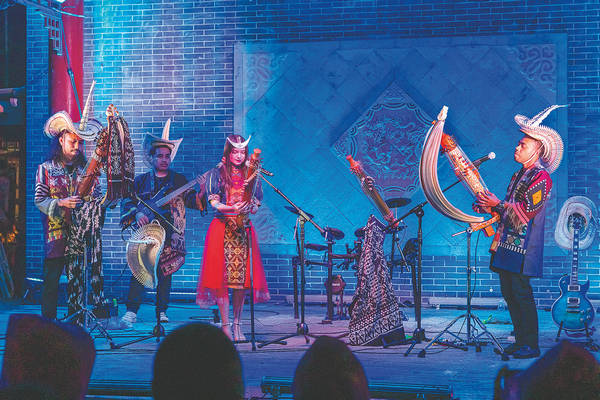
A music festival, held from May 13 to 14, gathers bands hailing from Chinese ethnic groups and musicians from ASEAN countries, including Indonesian Jenny Besin and her band and the Mumian ensemble, adding a cultural allure to Guyuepo village in Nanning, Guangxi Zhuang autonomous region.[Photo/China Daily]
Guangxi ethnic performers and ASEAN bloc musicians exchange musical culture, establishing bonds, report Xing Wen and Shi Ruipeng in Nanning.
Under the soft patter of a light drizzle, bands hailing from Chinese ethnic groups, such as the Lahu and Zhuang, along with musicians from across the ASEAN bloc, serenaded audiences with mesmerizing melodies produced by traditional instruments, while bustling food stalls served up an array of delectable cuisines.
This hometown-themed music festival was held in Guyuepo village, Nanyang town of Nanning, capital of the Guangxi Zhuang autonomous region, from May 13 to 14.
The opening band was the Mumian ensemble (mumian meaning kapok), formed in 2012 and consisting of five Zhuang musicians.
The band has made a name for itself through participation in cultural events promoting Zhuang traditional culture.
In 2015, they released their debut album and embarked on their first concert tour within Guangxi. Their original compositions feature a distinctive musical style revolving around blending traditional Zhuang folk songs with modern pop elements.
They skillfully incorporate a mix of instruments, harmonies and vocal styles, presenting a fresh interpretation of Zhuang music and allowing more people to appreciate its unique charm.
"We are delighted to participate in this international music festival, which has provided us with the chance to connect with foreign bands from such countries as Indonesia and Malaysia," says Lu Jianping, founder of the group.
He says that through this exchange of music and culture, participants have deepened their mutual understanding and made significant advances through shared learning.
"We will continue to uncover the cultural essence of ethnic music in Guangxi and create more distinctive musical works that represent the Zhuang ethnic group," says Lu.
"Through music, we aim to foster a greater understanding of Guangxi among audiences."
Jenny Besin, a member of an Indonesian pop band at the festival, was also enthusiastic.
"Participating in music activities in China has been a great honor and an amazing experience for me," says the Indonesian musician.
Being able to share Indonesian music with the audiences has made her proud, she adds. "The people I met here were kind and welcoming, open to learning about our culture. When I saw their appreciation, it made me feel more at home."
After seeing the other performances at the festival, she says that she has found the folk music scene in China to be "unique, memorable and amazing", and also believes it has the power to unite people.
The local government aims to create biannual rural music gatherings, centered around the key agricultural seasons of "spring sowing" and "autumn harvest".
These events will serve as platforms for facilitating artistic exchanges between China and ASEAN countries, while promoting the development and flourishing of indigenous music culture.
As a rural vitalizing endeavor, the music gatherings also aim to elevate the cultural appeal of Guyuepo village and the greater Nanyang town area.
Chen Chaofeng, Party secretary of Nanyang, says that the town plans to drive rural vitalization through developing its cultural industry.
"Building upon the success of the spring and autumn music festivals, our goal is to expand the frequency of similar events, aiming for quarterly or monthly performances," Chen says.
Efforts will be made to attract more musicians to establish studios in Nanyang and explore the production of ethnic musical instruments there.
"We hope to explore the aesthetics of traditional music in a modern context," Chen adds.
During the festival, music and cultural exchange centers co-established in Guoyuepo village by the local government and foreign institutions from countries including Indonesia, Malaysia and the Philippines also conducted opening ceremonies, showcasing their commitment to fostering cross-cultural connections and long-term friendship.

- Festival helps village tune into wider audience
- British vlogger experiences minority festival in Guangxi, S China
- Ploughing festival celebrated in S China’s Guangxi
- Sanyuesan Cultural and Tourism Festival held in S China’s Guangxi
- Local residents rent traditional costumes to celebrate Sanyuesan Festival in Guangxi
- Guangxi celebrating grand ethnic festival with influx of tourists
Popular Videos
Hot comments
- China Life: Chinese women shine with She Power
- First apes at U.S. zoo receive COVID-19 vaccine made for animals, zoo official says
- 86-year-old grandma in Hebei spends most her life on traditional cheongsam
- Lantern Festival: A romantic celebration in China
- Homemade curling videos trending in China
- Asia is young!
- Seven things you may not know about Lantern Festival
- China-ASEAN Expo witnesses changes in tech, life over 18 years
- Veteran free skier Xu wins gold in women’s aerials at Beijing 2022
- China successfully lands reusable test spacecraft
Top Reviews
- Huabiao Film Awards announces winners
- Xi congratulates university faculty, students on launch of "Macao Science 1" satellites
- Xi stresses unique role of auditing in Party's self-reform
- CE: Cathay crewmembers' disrespectful behavior hurt feelings of HK, mainland people
- Tibet urged to accelerate high-quality development
- China's Type 052D destroyer, J-10C fighters show openness, attract foreign interests at Malaysian expo
- EU fines Meta $1.3b over data breach
- Parking adjustments to help drivers in Nanning
- Festival helps village tune into wider audience
- RCEP boosts durian's popularity in Chinese market







